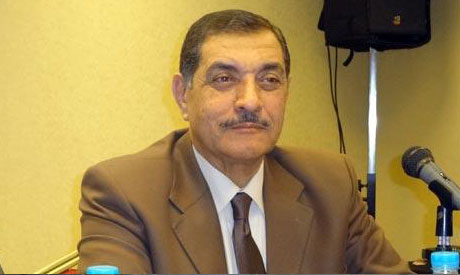
Hossam Khairallah (Photo: Al-Ahram)
Recent statements by the moderate Islamist Wasat Party leader Abul-Ela Madi claiming that Egypt's intelligence had established groups of hundreds of thousands of "thugs" have sparked uproar within the country's most influential security body.
"Anger is boiling over amid such continuing irresponsible statements from the [Wasat] party or other groups close to it," Hossam Khairallah, strategic analyst and former first undersecretary of Egypt's General Intelligence apparatus, told Ahram Online.
Khairallah – who ran in last year’s presidential elections that were ultimately won by the Muslim Brotherhood’s Mohamed Morsi – articulated the simmering discontent within the ranks of the intelligence apparatus over Madi’s statements, which many of its members reportedly perceived as an insult.
The former intelligence official also condemned Egypt’s presidency for not issuing a statement on the matter. He went on to predict that Egypt's current General Intelligence chief, Major-General Mohamed Raafat Shehata, would resign if the presidency failed to react “appropriately” to the matter and hold those behind the allegations responsible.
On Tuesday, Madi claimed at a Wasat Party meeting that Egypt's General Intelligence apparatus had established, during the Mubarak era, a secret group of 300,000 paid “thugs” over which the now-defunct State Security apparatus took control seven years ago. He went on to assert that these “thugs” had engaged in recent political violence.
Complicating the situation, Madi also contended that his assertions were based on information he obtained from President Morsi himself.
Khairallah, for his part, denied that anything of the kind had taken place during his 35-year tenure in the intelligence apparatus, stressing that Egyptian intelligence was devoted to information collection.
"Directing such considerable numbers needs thousands of leaders," he argued. "This is illogical. It has never happened under the rule of any of Egypt's presidents."
Khairallah was of the opinion that providing such information was not in the president's interests and could even jeopardize the state's national security.
"This gives Egypt's foes the opportunity to topple an apparatus that should act as a guiding light to the president," he asserted.
"It is the country's intelligence that should be the president's guide, not the [Brotherhood's] Guidance Bureau, which believes that [former General Intelligence chief] Omar Suleiman left a black box [of information] to the apparatus," he noted.
Khairallah also voiced doubt as to the future of cooperation between the presidency and Egyptian intelligence amid what he described as "attempts to target the intelligence apparatus."
Khairallah believes that any bid to 'Brotherhoodise' Egyptian intelligence would fail, since this would bring the presidency into conflict with the army.
He pointed out that, during Egypt's transitional phase of military rule, former military head Hussein Tantawi had issued a decree stipulating that the head of intelligence should be drawn from a military background. This, Khairallah believes, further rules out any possibility of the 'Brotherhoodization' of intelligence.
Recent weeks have seen scattered reports of the imminent appointment of Mohamed El-Beltagi, secretary-general of the Muslim Brotherhood's Freedom and Justice Party, as interior minister or intelligence chief. Such speculation, however, was later quashed by El-Beltagi, who on Thursday described the reports as "false rumours and fabricated news."
Short link: